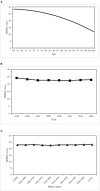Trends in Cognitive Function Among Chinese Elderly From 1998 to 2018: An Age-Period-Cohort Analysis
- PMID: 34900900
- PMCID: PMC8660074
- DOI: 10.3389/fpubh.2021.753671
Trends in Cognitive Function Among Chinese Elderly From 1998 to 2018: An Age-Period-Cohort Analysis
Abstract
Objectives: To investigate the effects of age, period, and cohort (APC) on trends in cognitive function among the Chinese elderly, and to explore how gender gaps in cognitive function change with age, period, and cohort. Methods: This study used data from the Chinese Longitudinal Healthy Longevity Survey (CLHLS) from 1998 to 2018, and included 90,432 participants aged above 65 years old. The measurement of cognitive function was the score of the Mini-Mental State Examination (MMSE). Cross-classified random-effect models were used to investigate age, period, and cohort trends in cognitive function. Results: Mini-Mental State Examination scores decreased with age at an increasing rate. While the cohort effect was nearly stable, the period effect demonstrated a downward trend from 1998 to 2002 followed by a nearly flat line. Females were associated with lower MMSE scores than males. When age increased, the gender gaps in MMSE scores further increased. The period-based gender gaps in MMSE scores diverged throughout the 20 years, while the cohort-based gender disparities in MMSE scores converged with successive cohorts. Conclusions: Age, period, and cohort had different and independent effects on cognitive function among the Chinese elderly. The effect of age was stronger than that of period and cohort. Gender disparities in cognitive function increased with age and period, and decreased with successive cohorts.
Keywords: China; age-period-cohort; cognition; elderly; gender disparity.
Copyright © 2021 Hu, Gu, Zhen, Sun, Gu and Dong.
Conflict of interest statement
The authors declare that the research was conducted in the absence of any commercial or financial relationships that could be construed as a potential conflict of interest.
Figures
Similar articles
-
Study on the age-period-cohort effects of cognitive abilities among older Chinese adults based on the cognitive reserve hypothesis.BMC Geriatr. 2024 Dec 4;24(1):992. doi: 10.1186/s12877-024-05576-z. BMC Geriatr. 2024. PMID: 39633278 Free PMC article.
-
Trends in activities of daily living disability among Chinese older adults from 1998 to 2018: an age-period-cohort analysis.Eur J Ageing. 2022 Mar 14;19(4):1167-1179. doi: 10.1007/s10433-022-00690-6. eCollection 2022 Dec. Eur J Ageing. 2022. PMID: 36506673 Free PMC article.
-
Association of cognitive impairment and elderly mortality: differences between two cohorts ascertained 6-years apart in China.BMC Geriatr. 2020 Jan 28;20(1):29. doi: 10.1186/s12877-020-1424-4. BMC Geriatr. 2020. PMID: 31992221 Free PMC article.
-
Changes in Cognitive Function and Risk Factors for Cognitive Impairment of the Elderly in China: 2005-2014.Int J Environ Res Public Health. 2019 Aug 9;16(16):2847. doi: 10.3390/ijerph16162847. Int J Environ Res Public Health. 2019. PMID: 31404951 Free PMC article.
-
Cognitive decline and mortality among community-dwelling Chinese older people.BMC Med. 2019 Mar 15;17(1):63. doi: 10.1186/s12916-019-1295-8. BMC Med. 2019. PMID: 30871536 Free PMC article.
Cited by
-
Using machine learning algorithms for predicting cognitive impairment and identifying modifiable factors among Chinese elderly people.Front Aging Neurosci. 2022 Aug 11;14:977034. doi: 10.3389/fnagi.2022.977034. eCollection 2022. Front Aging Neurosci. 2022. PMID: 36034140 Free PMC article.
-
Association between cognitive impairment and risk of atrial fibrillation: The Atherosclerosis Risk in Communities study.Cardiol J. 2024;31(4):553-563. doi: 10.5603/cj.93107. Epub 2023 Oct 19. Cardiol J. 2024. PMID: 37853826 Free PMC article.
-
Cohort trends in intrinsic capacity in England and China.Nat Aging. 2025 Jan;5(1):87-98. doi: 10.1038/s43587-024-00741-w. Epub 2024 Dec 19. Nat Aging. 2025. PMID: 39702725 Free PMC article.
-
Relationship between renal function and cognitive impairment in patients with stable schizophrenia: a multicenter cross-sectional study.BMC Psychiatry. 2025 May 15;25(1):494. doi: 10.1186/s12888-025-06952-8. BMC Psychiatry. 2025. PMID: 40375202 Free PMC article.
-
Interaction of High-Sugar Diet and History of Stroke with Risk of Cognitive Decline in Older Adults.Med Sci Monit. 2022 Sep 5;28:e937572. doi: 10.12659/MSM.937572. Med Sci Monit. 2022. PMID: 36059134 Free PMC article.
References
-
- National Bureau of Statistics of the People's Republic of China . National data. (2021). Available online at: http://data.stats.gov.cn/easyquery.htm?cn=C01 (accessed July 10, 2021).
-
- United Nations, Department of Economic and Social Affairs, Population Division . World Population Prospects 2019. (2019). Available online at: https://population.un.org/wpp/DataQuery/ (accessed July 10, 2021).
-
- Prince M, Wimo A, Guerchet M, Ali G, Wu Y, Prina M. World Alzheimer Report 2015, the Global Impact of Dementia: An Analysis of Prevalence, Incidence, Cost and Trends. (2015). London: Alzheimer's Disease International (ADI).
Publication types
MeSH terms
LinkOut - more resources
Full Text Sources



